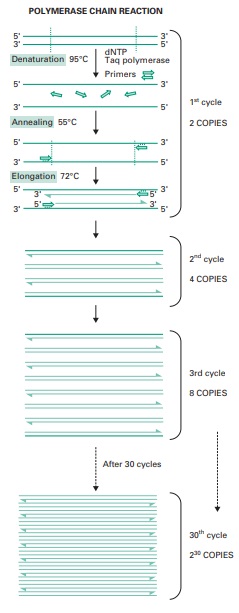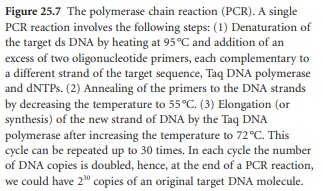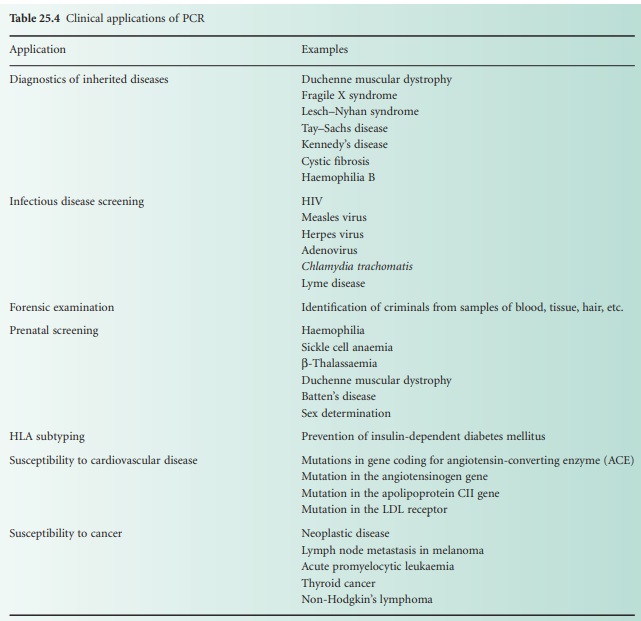Amplifying DNA: The Polymerase Chain Reaction
| Home | | Pharmaceutical Microbiology | | Pharmaceutical Microbiology |Chapter: Pharmaceutical Microbiology : Recombinant DNA Technology
The polymerase chain reaction (PCR) is an extremely simple and powerful technique that was perfected by Kary Mullis in the mid-1980s and has revolutionized many studies in molecular biology, currently having applications ranging from forensic studies to the development of new recombinant drugs.
AMPLIFYING DNA: THE POLYMERASE CHAIN REACTION
The polymerase chain reaction (PCR)
is an extremely simple and powerful technique that was perfected by Kary Mullis in the
mid-1980s and has revolutionized many studies in molecular biology, currently
having applications ranging
from forensic studies
to the development of new recombinant drugs.
This technique allows the generation of large amounts of copies of a specified DNA sequence from a single DNA molecule
without the need for cloning.
The PCR
exploits certain characteristics of DNA replication, as it uses single-stranded DNA (ss DNA)
as a template for the synthesis
of complementary new strands
in a 5′ to 3′ direction. The ss DNA templates can be generated by heating
ds DNA above 90 °C.
DNA polymerase synthesizes ds DNA by extending the complementary strand of a template. Hence the DNA polymerase can be directed to synthesize a specific region
of DNA by using a synthetic, complementary oligonucleotide
primer that will anneal to the template when the temperature is lowered. The PCR reaction uses a special
DNA polymerase (Taq DNA polymerase from the thermophilic bacterium Thermus aquaticus) that
can withstand temperatures above 100 °C and has an optimal
activity at 72 °C, which has the advantage of reducing non-specific
primer annealing that may occur at lower temperatures.
In PCR both strands
of a target DNA serve simultaneously as templates upon
the addition of a pair
of primers, one for
each strand of DNA. A typical PCR amplification
is shown
in Figure 25.7.
Every PCR cycle
is normally repeated up to
30 times. The net result of a PCR is
that, at the end of n cycles, it will generate 2n ds
DNA copies of a single
DNA fragment located
between the two primers.


A) Advantages And Limitations Of PCR
There are some obvious
advantages of using PCR. The main one is specificity, as it allows,
using the appropriate primers, the amplification of specific DNA fragments from a population of different cells.
It is also a very rapid technique, as it only takes a few hours to amplify a
fragment of DNA compared
with days using conventional cloning methods. An important feature
of PCR is its versatility, as it allows
the incorporation of mismatches
on the 5′ end of the primers provided
that the 3′ end
has perfect
complementary with the targeted strand. This
can be exploited to add restriction sites
to enable subsequent cloning
of the amplified DNA, or introducing
specific mutations into
genes. Furthermore, the equipment used for PCR is relatively inexpensive and allows the analysis of a large number of samples at
one time. Finally, PCR does
not require purified
template DNA and can amplify genes
from whole cells
or tissue samples.
However, there are also
a number of limitations to the
use of PCR. The designing of primers for this technique requires some knowledge of the DNA sequence to be amplified. Although there are new genetically engineered DNA polymerases that can synthesize large fragments of DNA, there are still some
restrictions with regards
to the maximum length
of DNA that can be amplified. Ideally, fragments of 0.1–3 kb can be easily amplified
although this
technique, under the appropriate conditions, would amplify larger fragments (up to 20 kb). In addition, the slightest sample contamination can lead to
false positive results, which can have detrimental effects
when this technique is used in diagnostics. Finally, sometimes there is a risk
of non-specific amplification when the primers anneal to sequences similar
to the targets, leading to the
amplification of the
wrong DNA.
B) Clinical Applications Of PCR
The development of PCR has revolutionized not only
basic research
but also different areas of medicine.
Table 25.4 lists some of the most important clinical
applications of PCR. These types of analysis were practically impossible without PCR owing to the large
amount of samples that needed
handling, the amount of time required to obtain
results or the lack of sensitivity of the
available tests.

Related Topics
